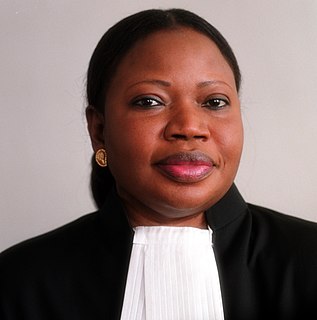A Quote by Yakubu Gowon
I am ready to face the International Criminal Court of Justice at the Hague for prosecution over roles played by me when the war ended
Related Quotes
I wouldn't join the International Criminal Court. This is a body based in The Hague where unaccountable judges, prosecutors, could pull our troops, our diplomats up for trial. And I wouldn't join. And I understand that in certain capitals of, around the world that that wasn't a popular move. But it's the right move not to join a foreign court that could, where our people could be prosecuted.
I think the International Criminal Court could be a threat to American security interests, because the prosecutor of the court has enormous discretion in going after war crimes. And the way the Statute of Rome is written, responsibility for war crimes can be taken all the way up the chain of command.
The International Criminal Court uses a prosecution-only approach. And by putting their fate in the hands of outsiders, countries are really dodging responsibility for actions taken in the name of that country, in the name of the people in that country, by the people of that country themselves. That is, I think, fundamentally the wrong direction to go in.
I think the International Criminal Court could be a threat to American security interests, because the prosecutor of the court has enormous discretion in going after war crimes. And the way the Statute of Rome is written, responsibility for war crimes can be taken all the way up the chain of command. This is the sort of investigation that some people who live in Fairyland might like to undertake, but which bears no relationship at all to conditions in the real world.
The International Criminal Court, like most international institutions, is a wonderful idea. A noble idea. All it needs to work is planetary government, worldwide democracy and the triumph of reason over tribal loyalties, political doctrines and individual ambition. In other words, it requires that we all live in the world described by the "Star Trek" television shows.






























